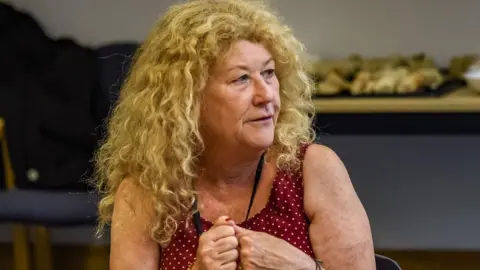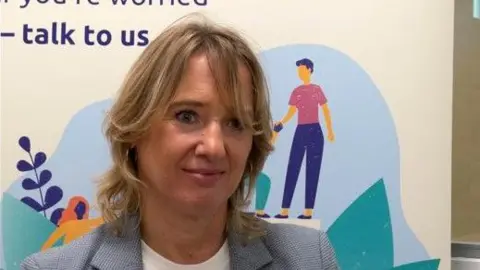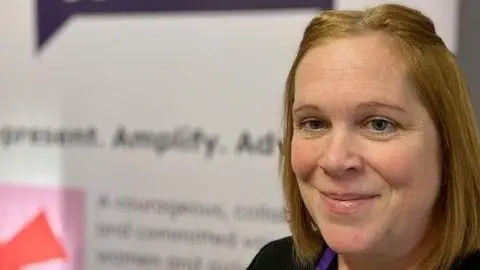How domestic violence victims are being supported
 NORTHUMBRIA PCC
NORTHUMBRIA PCCIt is White Ribbon Day, which forms part of a campaign to end violence against women and girls, and the BBC has been finding out more about what organisations in the north-east of England are doing to help victims.
More than 460 women have received specialist support for domestic abuse in the last year after a force based specialists in its emergency control room.
Northumbria Police, which said it received about 115 calls about domestic violence a day, started the project in 2022.
It involves 999 callers being able to speak to domestic violence experts, as well as police.
The North East has the highest rates of domestic violence in England, at 19 per 1,000 population compared to the England average of 11, according to Health Equity North.
'More empowered'
Northumbria’s Labour police and crime commissioner Susan Dungworth said the control room scheme worked by callers being given the chance to speak to someone who could offer more support.
"It's working really well. We're getting positive feedback both from people that have used the service but also from our staff who are feeling much more confident, much more empowered to deal with the issue," she said.
The force has also started offering "active bystander" training to employers to tackle sexual harassment in workplaces, and has launched a series of resources for teachers to use in schools, to help tackle misogynistic behaviour among pupils.

The government has pledged to halve violence against woman and girls in a decade.
Minister for Safeguarding Jess Phillips said the issue was a "national emergency".
She said: "We will introduce bold measures to improve the police response to these crimes, offer strengthened protection for victims and hold perpetrators to account."
That is welcomed by the chief executive of charity Wearside Women in Need (WWIN) Laura Seebholm, but she said she wanted more detail, and innovative solutions and resources were needed.
The charity has recently set up an anonymous phone line for victims' families and friends to report abuse.
"So often it's family and friends who are the first to know, and the first to understand that something's not right in a relationship," she said.
"But actually they don't know how best to support.
"We're really keen that this will extend into family and friends being able to report abusive behaviour because we can’t just rely on victims, and survivors sometimes are just so frightened to seek support that actually all of us need to take responsibility for this."
'Trusting the process'
One woman who has been supported by the charity encouraged others to seek help.
"It is hard but I’d say to anyone in this situation – reach out and make the phone call," she said.
"There are people out there that can help you, and you can come out of it.
"It’s just about trusting the process. And knowing that it will be hard and it will be painful.
"But if you push yourself, you can get past the part that it hurts."

Represent Woman is a new organisation for women in the region.
Director for policy and advocacy Erin Parker Leonard said women in northern England faced "disproportionate issues", like poverty and deprivation and so a localised response was needed.
"Women's organisations are working tirelessly, but with higher demand," she said.
"For example, Tyneside Women's Health - they saw an increase of over 400% in women reporting domestic abuse between 2022 and 2024. So that's astronomical.
"That’s what we need to remind the government. This is what is happening on the ground."
'Long way off'
And while academics in the region also welcome the mission, some say the focus needs to shift from supporting victims to tackling perpetrators.
Professor Nicole Westmarland, director of the Durham Centre for Research into Violence and Abuse, said to meet the government's target there had to be "a serious look at prevention".
"And we’re a long way off that," she said.
"We need, of course, to have the services that victims and survivors need in order to get that support and move on with their lives.
"But that in itself will not halve violence against women and girls."
Follow BBC North East on X, Facebook, Nextdoor and Instagram. Send your story ideas to [email protected]
